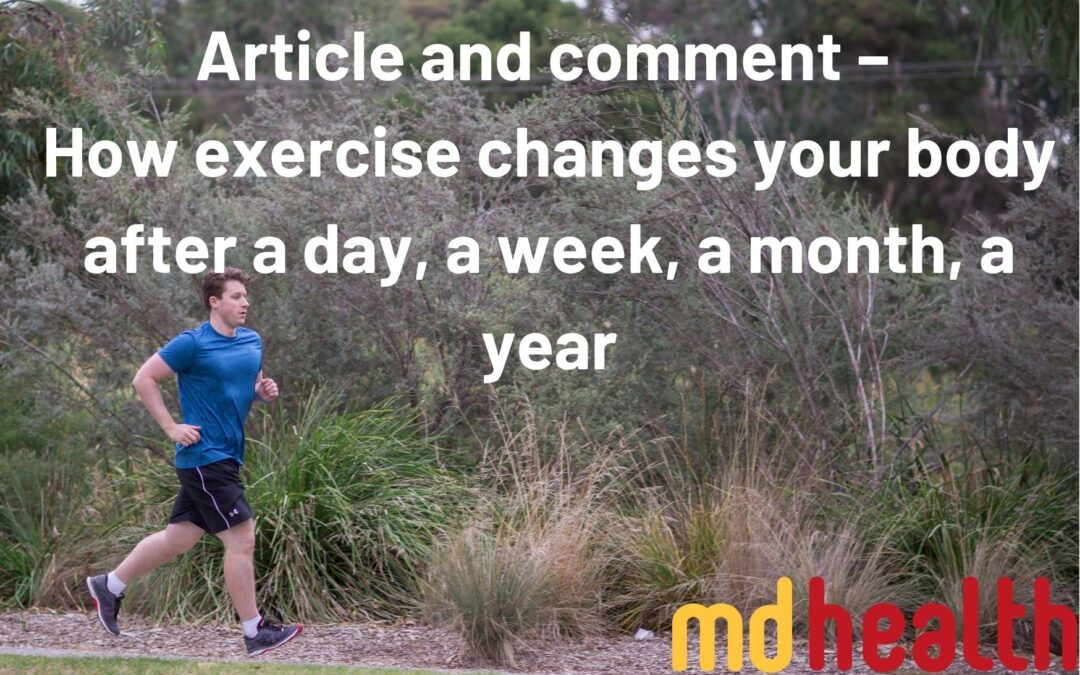This is a great article that summarises the expected changes with exercise after different periods of time.
The time frames are realistic and explain why people feel the changes that they do under the surface.
What happens the day of exercise:
These are some of the changes that occur during your exercise program:
- The exercise itself is a brain co-ordination activity, involving your nerves firing in new ways to learn new movement patterns. This process is tiring. Even if you have been exercising during lockdown, returning to the clinic involves re-learning exercises that you have not done for a while. Therefore it is normal to feel tired again, even if you have done these exercises before lockdown.
- During the exercise, your body will pump blood to the muscles to oxygenate them and provide nutrients for activity. This is the first stimulate for your blood vessels and muscles to grow once again.
The day after exercise
Especially after an absence from exercise, here are some of the immediate effects:
- Delayed onset of muscle soreness (DOMS) – This is the most common side effect of intense and new exercise. The soreness is a result of small tears in the connective tissue between the muscle fibres, and are absolutely NORMAL. This feels like a “bruised” or “heavy” sensation in the muscles on either the day after or two days after exercise. It will feel like it is too hard to walk up stairs or sit down into a chair, but this is a normal part of initial exercise and will pass. Doing light exercise, such as going for a walk will help speed up recovery. However, generally you do not have to do anything. This sensation will pass by itself.
- There is a difference between DOMS and pain. If it is a bruised/soreness sensation, this is DOMS and is normal. If the pain is within the joints and feels more like a sharp/painful sensation, not a bruised/soreness feeling, this is a concern for us and it is important to let us know about it in your next session.
- After training, as your body begins the process of adapting after exercise, your resting metabolic rate increases as your body begins the repair and growth process. “One study showed that, after 45 minutes of vigorous cycling, participants experienced an approximately 40 per cent rise in their metabolic rate for 14 hours”
- This repair process requires rest, so it is not unusual to find that you sleep better on the nights after you exercise.
The week after exercise:
- It is not unusual to feel a bit more energetic, because exercise has a mood-boosting effect, due to the release of endorphins. This will help make you motivated to continue to exercise again the next week
- Under the surface, inside the muscle cells, the small energy producing instruments, the mitochondria, are beginning to multiply to become more efficient at releasing more energy when required. However, it is too early to see any physical changes in your body from the surface
After a month of exercise:
- For the first 6-7 weeks of exercise, you will feel like you are becoming stronger, can tolerate your workout better and recover faster between sessions. However, there is still very little “physical” changes that will be obvious from the surface.
- Most of the improvements in strength and function are from more efficient nerve connections into the muscles, so that the firing patterns of your muscles is more selective and responsive. The blood vessels into the muscles have grown and become more efficient (angiogenesis). This results in increased hydration to the muscles. It also improves pumping of blood around your body, as your heart strengthens and your circulating blood volume improve to match your physical activity needs.
- A physical change in your appearance usually starts to happen at around the 3-month mark, when there is early stage muscle growth. This will change the way you look as well as the way you feel.
After a year of exercise:
This is when you are really feeling the effects of exercise and the consistent work you have put in into your health. You should find that:
- Your ability to keep your muscles contracted and muscle endurance will be better, and you should be finding that you can lift more. Your body will be more agile and in general you should have less joint and muscle pain.
- In general, you should find that your potential recreational pursuits have increased, so that you can choose to take on more challenging activities than you were previously able to.
- Your heart, bones and muscles are all generally stronger, reducing your risk of chronic disease such as heart disease, diabetes and several different types of cancers, especially breast and bowel cancers. In addition, people who exercise regularly are happier and tend to have better mood and confidence.
- Finally, even if you have not reached all your physical goals, you would have noticed a change in your appearance, muscle mass and general posture.
Aubrey, S (2021) How exercise changes your body after a day, a week, a month, a year. The Age, 16th November 2020.
Do you have any questions?
- Call us on (03) 9857 0644 or (07) 3505 1494 (Paddington)
- Email us at admin@mdhealth.com.au
- Check out our other blog posts here
Our clinical staff would be happy to have chat if you have any questions.



